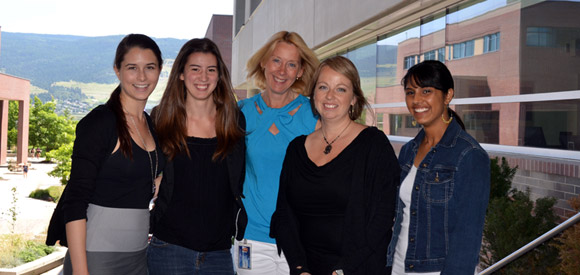
UBC Assoc. Prof. Barb Pesut, centre, and her research assistants, from left, Sarah Koss, Miranda Dalhuisen, Lynnelle Erbacker, and Bhavn Sraon assisted the community of Princeton in applying for a teambuilding grant that will help the community explore options for residents living with life-limiting chronic illness.
Teambuilding grant brings residents and researchers together
A partnership between UBC faculty and residents of Princeton might just be what the doctor ordered for that small, rural community.
Members of the Princeton Support Our Health Care Coalition (SOHC) will work with researchers from UBC’s Okanagan campus to gain knowledge about how to improve care for people in Princeton who live with life-limiting chronic illness.
Princeton has struggled through its own health care crisis in the past—too few physicians, an aging population, and a hospital threatened by emergency room closures. Currently, the hospital emergency department is closed four nights each week and acute and specialist care services have been reduced, often resulting in people driving to Penticton or Kelowna for medical services.
UBC Assoc. Prof. Barb Pesut, Canada Research Chair in Health, Ethics, and Diversity, says the burden of having to travel for health care may mean that people choose not to attend a medical appointment, delay treatment, or re-locate away from their home community.
“The challenges facing rural communities such as Princeton are enormous. The solutions are going to be found in building strategic partnerships that support community capacity,” says Pesut. “Princeton is fortunate to have so many concerned and active citizens.”
Pesut notes that three significant issues have created the “perfect storm” within Princeton’s health care system: an aging population with multiple chronic illness conditions, its rural location, and a province-wide physician shortage.
The SOHC is a grassroots group of citizens concerned about the state of healthcare in their community. Ed Staples, Regional District Area H Alternate Director and Vice-President of the SOHC, describes the care of those with chronic illness as a “mosaic approach” that can often leave people without enough support.
“People suffering from chronic illness are cared for on a variety of levels and by a variety of people, including family physicians, community volunteers, family members, and community service organizations,” he says. “This mosaic approach to care raises several questions: Are chronically ill residents receiving the care they need and deserve? Are they aware of all the services that are available to them?”
More concerning, he notes, is when one part of the mosaic is not available, such as a family member, there may not be anybody to fill in that gap. And what are the costs—financial, emotional, and physical—shouldered by these individuals?
A local committee, made up of residents and SOHC members, will work with UBC researchers while they try to answer questions surrounding available services for the chronically ill. Pesut describes the work as an exchange of knowledge. Princeton residents will help UBC researchers better understand the healthcare issues in their community. In exchange, the committee hopes to benefit from the expertise of UBC’s researchers.
“It really is a good example of a teambuilding partnership and knowledge exchange,” she says. “We teach them, they teach us, and in the end we will be able to identify projects that might help the entire community of Princeton.”
The first step is to complete a survey of available resources, complete a literature review of current rural health care models and resources designed to support people with life-limiting chronic illness, and determine relevant and accessible baseline data to track outcomes.
“It’s possible that there are chronically ill members of our community who are not receiving the care they need, either because it’s not readily available or they cannot afford to pay for it,” says Staples. “The problem is that we don’t have a complete picture of the possible problem. That’s why we need accurate information and research to find out what’s going on in our community.”
With Pesut’s help, the SOHC applied for and received a $5,000 teambuilding grant from the Rural Health Services Research Network of BC. By next June, Pesut is hoping they will have identified some priority research questions and received some targeted resources to begin to answer those questions.
“The Princeton area is certainly overdue for some good news on the health care front,” says Staples. “And this collaboration is an important part of our efforts to build a program that can support much-needed health care improvements.”
—30—